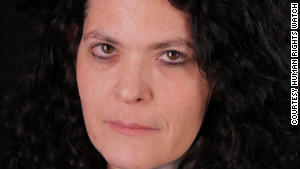Are Afghan women better off after a decade of war?
March 8, 2012 -- Updated 1052 GMT (1852 HKT)
Editor's note: Heather Barr is the Afghanistan Researcher for Human Rights Watch. She has lived in Kabul, Afghanistan, since 2007.
Kabul, Afghanistan (CNN) -- When U.S. forces toppled
the Taliban government following the 9/11 attacks, there was a global
wave of support from people horrified by the plight of Afghan women.
Under the Taliban, women had been denied education, banned from medical
treatment by male doctors, and publicly executed for "immorality."
The Taliban's fall
promised women some basic freedoms and rights. Indeed, over the past 10
years there have been significant improvements for Afghan women and
girls. Official restrictions ended on access to education, work, and
health care. Millions of girls went to school for the first time. Women
joined government, won elected office, and became police officers and
even soldiers. A new constitution in 2004 guaranteed women equal rights,
and a 2009 law made violence against women a crime.

Heather Barr
Underneath the surface of
these changes, however, deep seated problems persist. Women in public
life have suffered harassment, threats, and sometimes murder. Forced
marriage, underage marriage, and domestic violence are widespread and
too widely accepted.
About 400 women and girls
are imprisoned at present for the "moral crimes" of sex outside of
marriage and simply running away from home, often to flee abuse. While
education is more accessible, more than half of girls still don't go to
school. Every two hours an Afghan woman dies of pregnancy-related
causes.
As the announced
departure of international forces in 2014 draws closer, many Afghan
women look to the future with fear. They worry that the troop pullout
signals the end of interest in Afghanistan, and with it the
international commitment to push the Afghan government to promote and
protect women's rights. Also likely to decrease is the foreign aid that
pays for schools and clinics that have changed many lives. Afghan women
fear being abandoned again by the rest of the world, as they were during
the Taliban era.
Plans for peace
negotiations between the Taliban and the Afghan government raise the
specter of women's rights being bargained away. If there are no women at
the negotiating table, this is even more likely.
This week the fragility
of women's rights in Afghanistan has been on full display. The Ulema
Council, a government-supported body of religious leaders, issued a
statement on several issues, including the recent burning of copies of
the Quran at a U.S. military base. The longest part of the statement,
however, gave religious guidance on how women should be treated and
should behave.
The statement said some
good things. It prohibited a traditional practice of giving a girl to
another family to resolve a dispute ("baad"). It spoke against forced
marriage. It confirmed women's rights to inherit and own property.
On women's duties,
however, the statement took a turn for the worse: Women should not
travel without a male chaperone. Women should not mix with men while
studying, or working, or in public. Women must wear the Islamic hijab.
Women are secondary to men.
If this was just the
view of conservative religious leaders, it would be discouraging, but
just another in a long line of discriminatory statements about women
from Afghanistan's male dominated institutions. What caused
consternation, however, was the sense that President Hamid Karzai had
embraced the statement. In a departure from usual practice, the
statement was posted on the Presidential Palace website, distributed to
the media by the Palace, and defended by President Karzai at a news
conference.
President Karzai has a
mixed record on women's rights. He committed Afghanistan to an
international convention promising equal rights for women and pushed
through by decree the 2009 law making violence against women a crime. He
recently spoke out on two high-profile cases of violence against women.
On the other hand, in
the run-up to the 2009 presidential election he curried favor with
hard-liners by signing the Shia Personal Status Law, which, for
Afghanistan's Shia minority, gives a husband the right to withdraw
maintenance from his wife, including food, if she refuses to obey sexual
demands, grants guardianship of children exclusively to men, and
requires women to have permission from their husbands to work. Some
women fear that Karzai is using the Ulema Council statement to send a
message about what compromises he is ready to make with the Taliban.
With international
interest in Afghanistan waning, negotiations with the Taliban in the
offing, and Karzai's endorsement of the Ulema Council's statement,
Afghan women are more vulnerable than at any time in the past 10 years.
Now President Obama and other backers of the Afghan government should
make it clear that they will not support any deals that sacrifice
women's rights, and press Karzai to make his position clear. The risks
for Afghan women are too high to do anything less.
http://edition.cnn.com/2012/03/08/opinion/afghanistan-women-rights-barr











No comments:
Post a Comment